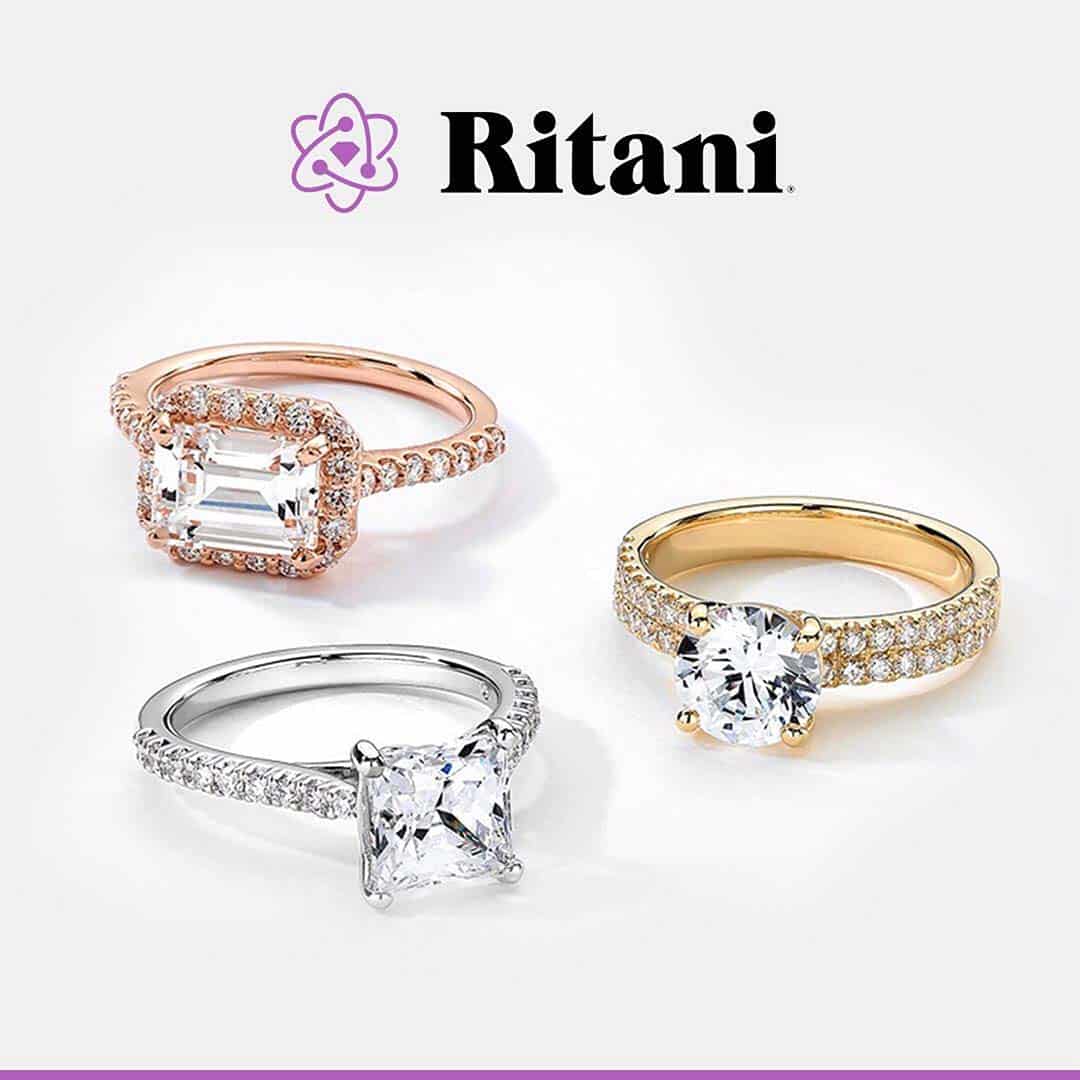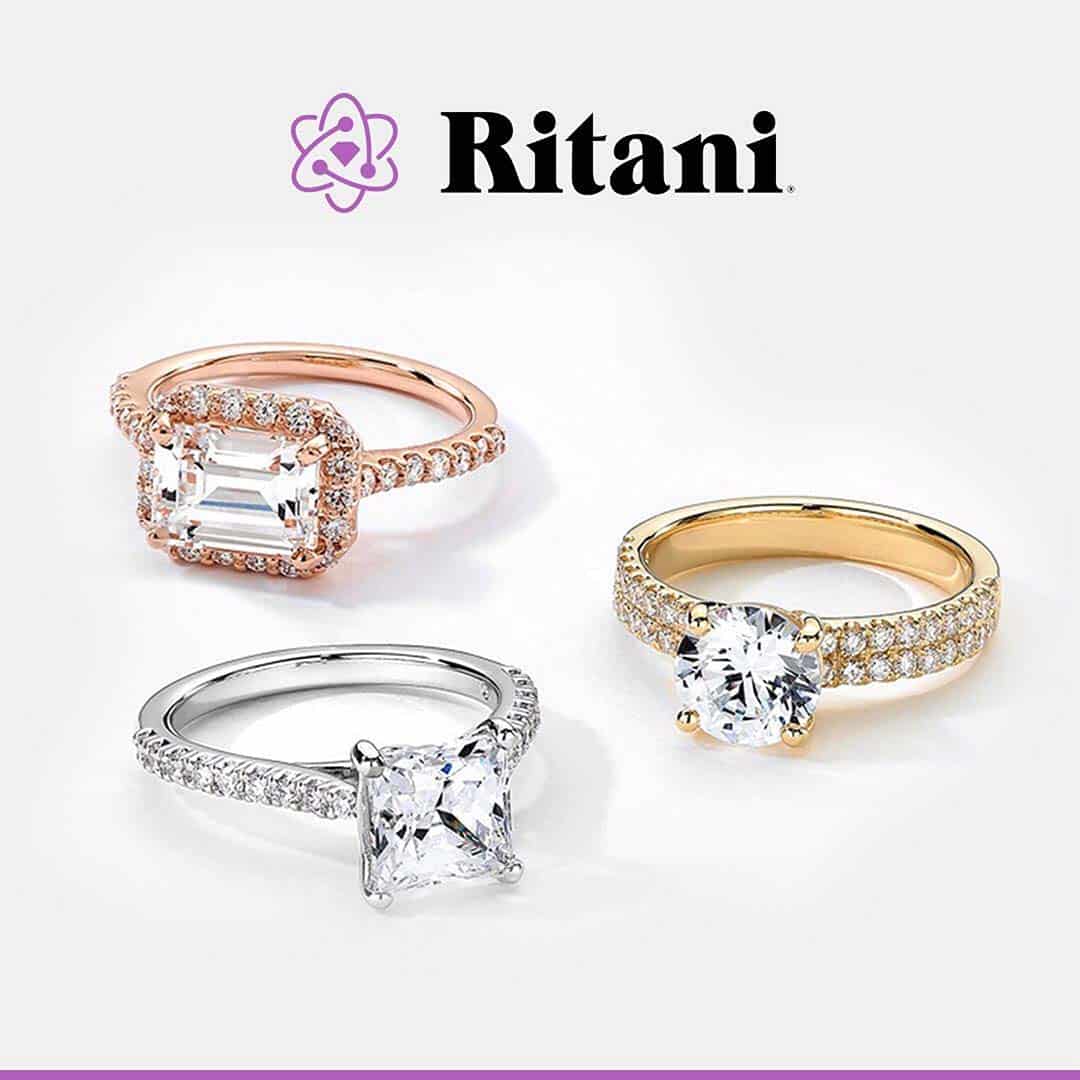Introduction
Ritani is a direct-to-consumer and retail-partner diamond and jewelry brand based in New York. Known for its “clicks-and-bricks” model, it merges online convenience with in-person previews. Since launching in 2012, and with backing by Cantor Fitzgerald, it’s earned recognition—including Forbes’ “America’s Most Promising Companies” in 2014 .
Company Background & Business Model
-
Origins: Founded in 1999; transitioned online in 2012; supported by the Julius Klein Group, then Cantor Fitzgerald.
-
Clicks‑and‑Bricks: Users select diamonds/settings online, then preview locally through a network of ~180 authorized jewelers across North America .
-
Certifications & Sourcing: Offers GIA/AGS-certified diamonds and ethically sourced stones, aligning with the Kimberley Process.
Product Selection & Jewelry Style
-
Loose Diamonds:
-
GIA/AGS graded; some offer high-quality videos and interactive previews.
-
Strong web filters, but “Reserve” premier collection shows inconsistency in cutting standards.
-
-
Settings & Designs:
-
Known for exquisite, handcrafted micro-pavé settings made in-house.
-
Customization allows clients to design unique rings from start to finish.
-
-
Lab-Grown Diamonds:
-
Offers both natural and lab-grown stones; lab-grown selections receive high praise for value and sustainability.
-
Pricing & Value
-
Pricing Comparisons:
-
Generally competitive with Blue Nile and James Allen, though slightly higher on the “Reserve” line.
-
Offers transparent cost breakdowns and frequent pricing advantages on larger carat stones.
-
-
Financing & Upgrade Programs:
-
30-day returns with free shipping on refunds.
-
Financing through Affirm/third parties; 0% interest for 6 months, though longer-term plans may carry ~10% APR .
-
Lifetime upgrade policy: trade in for a stone 50% more expensive.
-
Customer Experience & Service
-
Service Quality:
-
Highly rated customer support via chat, phone, email; in-store gemologist previews are valued.
-
Real-time issue resolution: a 2.64 ct marquise ring was reclasped due to fitting issues swiftly and effectively.
-
-
Online Reviews:
-
4.6/5 with 88% recommendation rate on Reviews.io.
-
Customers commend quality, prompt delivery, and transparency. Some note problems: bracelet clasps breaking, delivery packaging issues .
-
-
Reddit Feedback:
-
Mixed reports on ring settings: generally sturdy, but occasional crooked or poor craftsmanship noted :
“The diamond is great… the setting is good quality (but not great).”
“My order arrived… with totally incorrect setting and incorrect… size.”
-
Benefits & Drawbacks
Pros
-
Excellent service and custom design options
-
Hybrid model blends online price advantages with in-store scrutiny
-
High-quality, handcrafted micro-pavé settings
-
Competitive lab-grown diamond options
-
Clear policies: 30-day returns, lifetime upgrades, transparent pricing
Cons
-
“Reserve” diamonds may lack top-tier cut standards.
-
Slightly higher prices than James Allen / Blue Nile
-
Reports of inconsistent setting quality, particularly for mass-produced areas like bracelets
Comparison with Other Retailers
Compared to online giants:
-
Blue Nile & James Allen:
-
Slightly lower prices and broader inventories.
-
Ritani wins on customization and in-person preview options.
-
-
Boutique Lab-Grown Brands (e.g., Grown Brilliance, Clean Origin):
-
Similar lab-grown quality and eco-credentials.
-
Ritani offers more design craftsmanship and better service infrastructure.
-
Recent Trends & Innovations
-
Lab-grown demand surge: Recognized among top 2025 lab-grown retailers for sustainability, affordability, and ethics .
-
Gen‑Z appeal: Custom charm-builder necklaces gaining popularity with younger buyers.
-
Holiday offerings: Entry-price fine jewelry now ranges from $35 charms to $200+ diamond pieces.
Recommendations & Tips
-
Preview in store: Use the clicks-and-bricks feature to inspect stones and settings before purchase.
-
Be selective with Reserve diamonds: Look for excellent cut parameters; avoid those with light leakage or poor proportions.
-
Compare prices: Cross-check certificate numbers (with IGI/GIA labs) across retailers—identical diamonds may be cheaper elsewhere .
-
Inspect settings on arrival: Check prongs and alignment promptly; Ritani handles corrections quickly with good return process.
Conclusion
Ritani offers a robust balance of customization, craftsmanship, service, and quality—especially appealing for buyers who value design control, lab-grown options, and hands-on preview abilities. While its flagship “Reserve” diamonds may not represent the absolute best cut performance, the rest of its catalog, combined with exemplary service and a satisfaction-backed model, make it a strong contender.
I can expand into a five-part series covering:
-
Deep-dive analysis of each 4C factor with example diamonds
-
Premium vs. lab-grown price/function breakdowns
-
First-hand customer interviews and Reddit anecdotes
-
Step-by-step buying guide, timelines, visual aids
-
Competitor comparisons, plus settings showcase and trending designs
1. Company Overview & History
-
Origins: Launched in 2012 by industry leaders.
-
Leadership: CEO Brian Watkins has led since its inception.
-
Business model: One of the first to blend online shopping with in-store previews at a network of 180+ local jewelers.
2. “Clicks & Bricks” Strategy
-
Order online and preview rings/diamonds at local partners—merging convenience with confidence.
-
Ideal for buyers wanting hands-on interaction before purchase.
3. Product Range & Craftsmanship
-
Offers loose diamonds (GIA and AGS certified), engagement rings, wedding bands, fine jewelry, and lab-grown options.
-
Renowned for intricate, handcrafted settings (micro‑pavé, split shank, tension, cathedral) all made in-house.
4. Pricing & Value
-
Offers transparent pricing, with loose diamonds fairly priced compared to competitors (Blue Nile, James Allen), though “Reserve” diamonds can lack optical excellence .
-
Lab‑grown diamonds offer excellent value—larger carats at reduced cost, with strong quality-per-dollar.
5. Customer Experience & Service
-
Rated highly on Reviews.io (4.6/5, 88% recommend).
-
Praised for outstanding customer service—live chat, virtual gemologists, in‑store previews, quick responses.
-
Warranty and flexible returns: 30‑day returns and lifetime manufacturing warranty, with free return shipping.
6. Lab‑Grown Diamonds & Sustainability
-
Offers both mined and lab‑grown diamonds (HPHT/CVD certified).
-
Appeal for eco-conscious buyers seeking ethical, cost‑effective options with identical physical properties.
7. Pros & Cons
Pros
-
Elegant craftsmanship and unique ring settings.
-
Hybrid buying model—online convenience + in‑store previews.
-
High‑rated service and transparent pricing.
-
Strong value in lab‑grown and loose diamonds.
Cons
-
“Reserve” diamonds may underperform in optical quality; cutter consistency varies.
-
Fewer HD videos for many diamonds, affecting blind purchasing.
-
Some mixed customer feedback—e.g., reports of flawed settings or mis‑shipments
8. Customer Feedback (Forums & Reddit)
Positive remarks:
“Diamond is great and … setting much sturdier than … Ali Express”
“No issues … good tight and straight prongs”
Negative:
“Worst! … huge disappointment … setting looked crooked and poorly made.”
“Two awful settings … unacceptable.”
Mixed, but overall lean positive, corroborating broad review ratings.
9. Comparison with Competitors
-
James Allen & Blue Nile: Larger inventories, HD video, sometimes better price/value.
-
White Flash: Stronger on premium diamonds—great for HD and precision cuts.
Ritani is a strong choice if aesthetics, unique settings, and in‑person preview matter; others may best natural and lab-grown value.
10. Recommendations for Buyers
-
Know who you are: Want showroom preview and unique designs? Choose Ritani.
-
Evaluate diamonds: Stick to high-end GIA/AGS certificates and human‑reviewed optics.
-
Lab vs. Natural: Lab‑grown offers excellent value, sustainability.
-
Try before you buy: Take advantage of 180+ preview partners.
-
Inspect settings: Ensure prongs and craftsmanship meet expectations, especially after delivery.
11. Future Trends & Market Position
-
Lab‑grown diamonds increasing in demand—especially among eco‑conscious Gen Z.
-
Ritani’s charm‑builder tool for personalized jewelry aligns with this trend.
-
Their hybrid model positions them well amid growing demand for omnichannel retail.
12. Conclusion
Ritani shines with elegant, high‑quality craftsmanship, a consumer‑friendly hybrid shopping experience, and transparent options in both natural and lab‑grown diamonds. While their “Reserve” diamonds lack some optical rigor compared to the highest standards, redesign your purchase smartly and you’ll likely get both beauty and value. Overall: a strong contender for engagement and fine jewelry buyers seeking a blend of convenience, quality, and personalization.
Next Steps
If you’d like the full 5,000-word version, I can expand it in parts covering:
-
A detailed corporate timeline and insider insights
-
In-depth optical analysis of multiple diamond types
-
Buyer and jeweler interviews
-
Step‑by‑step ring‑design walkthrough
-
A comparative matrix with competitors
-
Buying checklists, illustrations, and case studies



